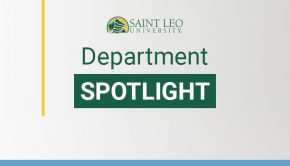A Wealth of Wellness — May 2020
The Benefits Department presents “A Wealth of Wellness” for the month of May.
New Coronavirus Resources: Log into the Saint Leo University intranet to read the latest information released by AETNA, Teladoc, and other sources. Click here!
Featured Webinar: “Managing worry in worrisome times.” Watch this webinar anytime >>
Monthly Awareness: May is Mental Health Month. Learn more >>
Let’s Talk: Children’s Mental Health. View the video>>
May Infographic and e-Health Video: “Find support in unexpected places” View tips >>
“Think Tank” Podcast: “Recognizing mental health issues in children” Listen now >>

Rally eligible events have started for the 2020-2021 benefit plan year!
RALLY Health Events for May
The webinar listed below is worth $10 in onsite Rally event credits—but only if you take the quiz afterward.
- “Change: How to adapt, cope, and respond” (this webinar originally aired at 3 p.m. on Friday, May 15). To earn your Rally credits, take the quiz >>
During May, watch the following Resources For Living webinars at www.resourcesforliving.com
Username: ICUBA
Password: 8773985816
Don’t forget to take the onsite event quiz here: Coping with COVID-19 Onsite Event
AIG Retirement Plan Meetings
If you would like to discuss your AIG/VALIC retirement plan from Saint Leo University or former employers, simply click on the link below to schedule a phone appointment with your VALIC/AIG Retirement Services financial advisor.
Schedule a phone appointment with your VALIC/AIG Retirement Services Financial Advisor >>
Dependent Care Flexible Spending Account Changes
Now you can make a change in your Dependent Care Flexible Spending Account (DCFSA) due to COVID-19 and the closure of child care centers, based on the available guidance, and the standard language in the Flexible Spending Account documents, a mid-year election change will be permitted.
A change in the number of hours for a current dependent care provider, a significant cost change in child care (so long as the provider is not a relative), or a change in dependent care providers will justify a corresponding midyear election change to the dependent care FSA. Click here for more information, or for the monthly newsletter, Click here.
Stress and Healthy Eating
If people only ate when they were hungry the diet industry would be devastated. The fact is, hunger is only a part of why we eat. We also eat to distract ourselves, to relieve tension, and for comfort. Many of us eat more—or less—than is healthful because of stress.
Why You Can’t Eat
Stress and the digestive system are intimately connected. In the “fight or flight” response to stress, hormones tell the stomach to either shut down or speed up while the body responds to danger. That’s why you lose your appetite or get nauseous when you’re in a dangerous situation. High levels of stress can trigger a constant level of anxiety in which you literally can’t choke food down.
Why You Eat Too Much
On the other hand, the milder anxiety of less intense stress may trigger excess eating for distraction, comfort, or tension release. And when you’re under stress, you’re more likely to eat fast, to eat high-calorie foods and to eat more often. For the small portion of the population with true eating disorders, such as anorexia, bulimia, and binge eating, stress can trigger a relapse.
What You Can Do
Keep a supply of low-calorie munchies handy at work. Avoid caffeine. Before you eat, try one of these stress-relieving exercises:
- Deep breathing: Take several deep breaths, using your stomach muscles, hold and let all the air out, feeling tension leave your body as you relax.
- Stretching: Shrug and rotate your shoulders; clasp your hands behind you and raise them to a comfortable height; stand up and reach for the ceiling; bend to either side to stretch the muscles of the torso.
- Take a brisk walk around the building.
- Close your eyes and visualize a favorite peaceful spot—a meadow in spring or your favorite hideaway. Do this until you begin to feel relaxed.
Managing Stress
Negative changes in eating habits are a sign that all is not well in your life. If your weight or eating habits have changed as a result of stress, you can be sure that your health is being affected in other ways as well. Take a look at your lifestyle and see if there is anything you can change to make it less stressful. Ask your doctor to refer you to a stress-management clinic, where you will learn such coping techniques as meditation, visualization, and progressive muscle relaxation.
Click Here For More Information About Stress Eating
Talkspace and Resources for Living
Talkspace is an online therapy platform that makes mental health care more convenient and accessible by connecting users with a network of 2,500-plus licensed therapists. With Talkspace, you can send unlimited multimedia messages to a therapist via web browser or the Talkspace mobile app—anywhere and anytime. Talkspace is provided to adults who are 18 or older.
Register your account at www.talkspace.com/RFL then download the app from your device’s app store. Enter your employer’s name when prompted for Organization name.
Have a behavioral health concern? Contact Resources for Living. For the latest AETNA resources on COVID-19, click here!
Keep in mind, you have endless resources for behavioral, mental, physical, and daily living health through the Employee Assistance Program (EAP). This is a FREE benefit provided to you by Saint Leo University through Aetna’s Resources for Living. For access to services, simply call (877) 398-5816 and select Option 1 for EAP.
Online: www.resourcesforliving.com
Username: ICUBA
Password: 8773985816
For questions, please contact Wellness.benefits@saintleo.edu






